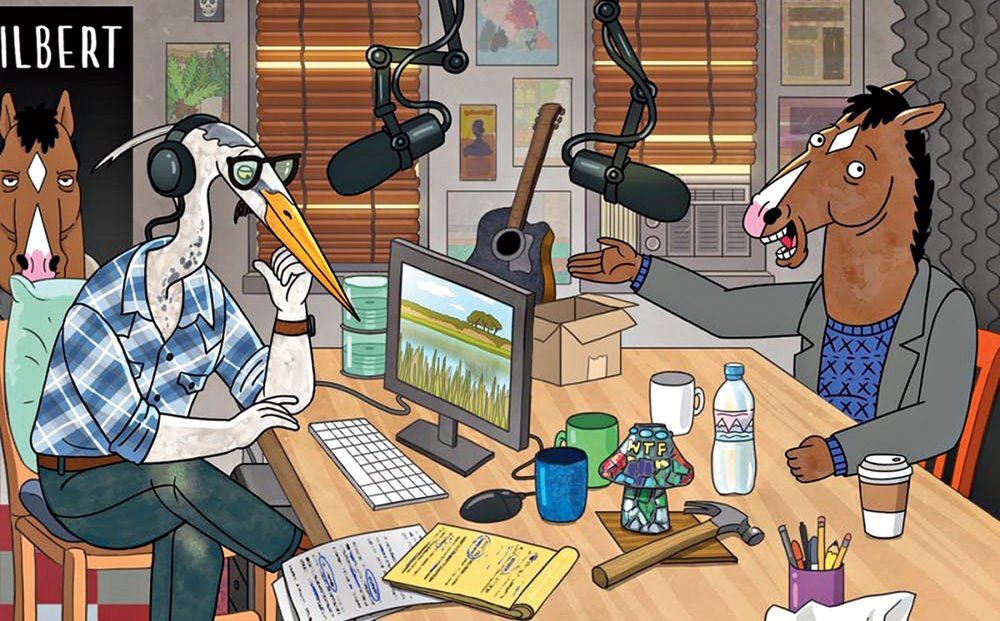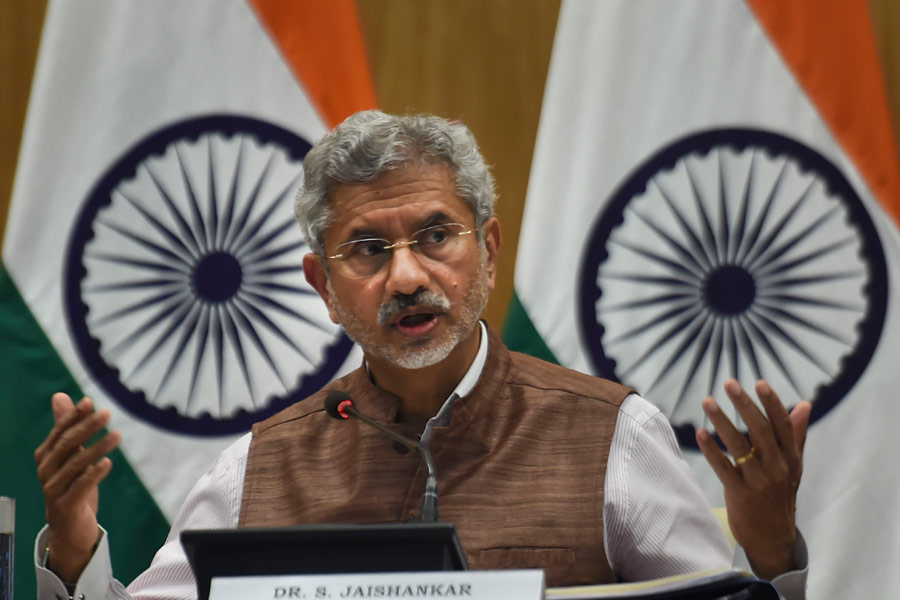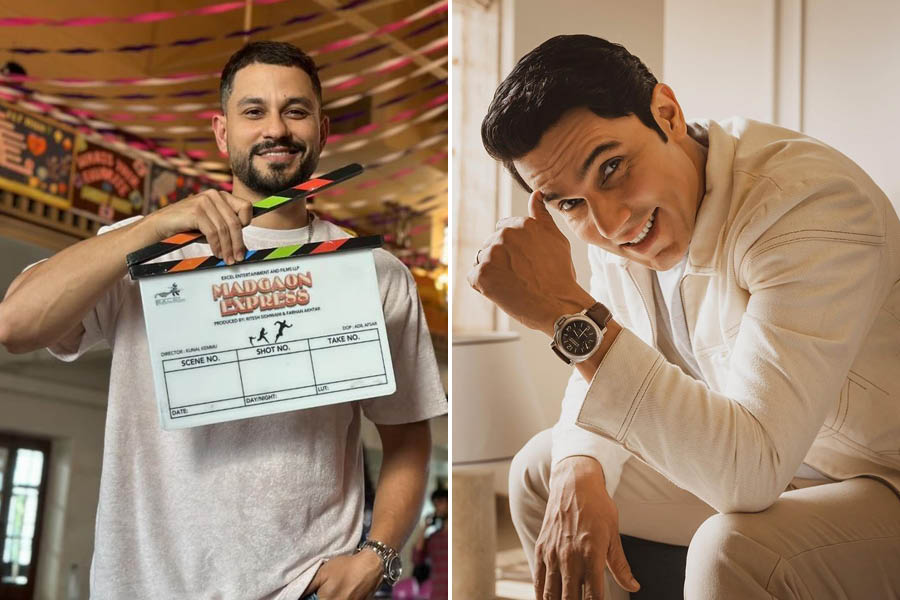We’ve long brushed off the notion that animated shows (cartoons for some) are only for kids, thanks primarily to The Simpsons, Family Guy and Archer, which are enjoying their 30-, 20- and 10-year landmarks respectively in 2019. And taking their dark humour and different take on life and its insecurities forward are shows like Big Mouth, Disenchantment and BoJack Horseman. Yet, there is a contrast. If we go by the plot of the longest-running animated show of all time that turns 30 this year — The Simpsons — and the most popular animated show entering its final season — BoJack Horseman — we find that 30 years ago people loved seeing a parody of themselves through the lens of satire but now we’re comfortable watching the protagonist of an animated show share the same insecurities as us. Adulting can be hard, The Telegraph finds out after watching these nine shows.
Bojack Horseman
Created by: Raphael Bob-Waksberg
By far one of the most popular series of our times, BoJack Horseman is about the struggles of trying to find your identity in the modern world. Set in a weird, whimsical world where anthropomorphic animals and humans live side by side, we follow a self-loathing alcoholic man-horse (or horse-man) struggling with depression after a role in a popular ’90s sitcom gave him a taste of fame. While it presents us a satirised version of issues like anxiety, drug abuse and mental illness, the show also gives us many moments of unexpected drama and countless moments that have us shedding a tear or two — often rivalling many of its live-action contemporaries. Unlike the other shows on our list, we can’t stick BoJack Horseman to a genre; it has its moments of fun and laughter but it’s also devastating, disdainful, melancholic and profound. While the storyline of the series is simple enough to fit in a single line, it’s when you reflect on the pursuit of lost glory that one starts thinking of the many insecurities life presents. Too bad, the final season is coming up in a few weeks.
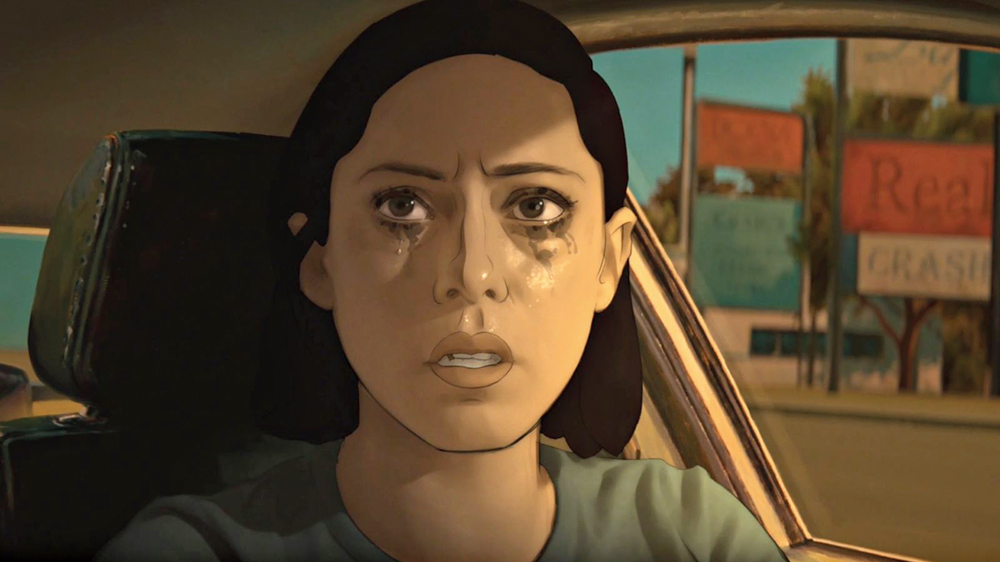
A scene from ‘Undone’ Courtesy: Amazon Prime
Undone
Created by: Raphael Bob-Waksberg and Kate Purdy
Coming from the same stable as BoJack Horseman, Undone is one of the most unique and thought-provoking animated series out there. We explore the world of Alma, a young girl who works in a day care, has a stable life and has a decent relationship with her mother, sister and boyfriend. However, as the show progresses, we see that she has been emotionally troubled after her astrophysicist father’s death and more often than not, finds herself trapped in the monotonous rut of life. She is fed up of the same old routine of waking up, driving to work, coming home after a long day and crashing at night.
The show takes a fantastical turn when she meets her dead father after a near-fatal accident and he makes her understand the importance of life. Undone makes you dive deep into your psyche, making you introspect and ask questions that you know you won’t have the answers to.
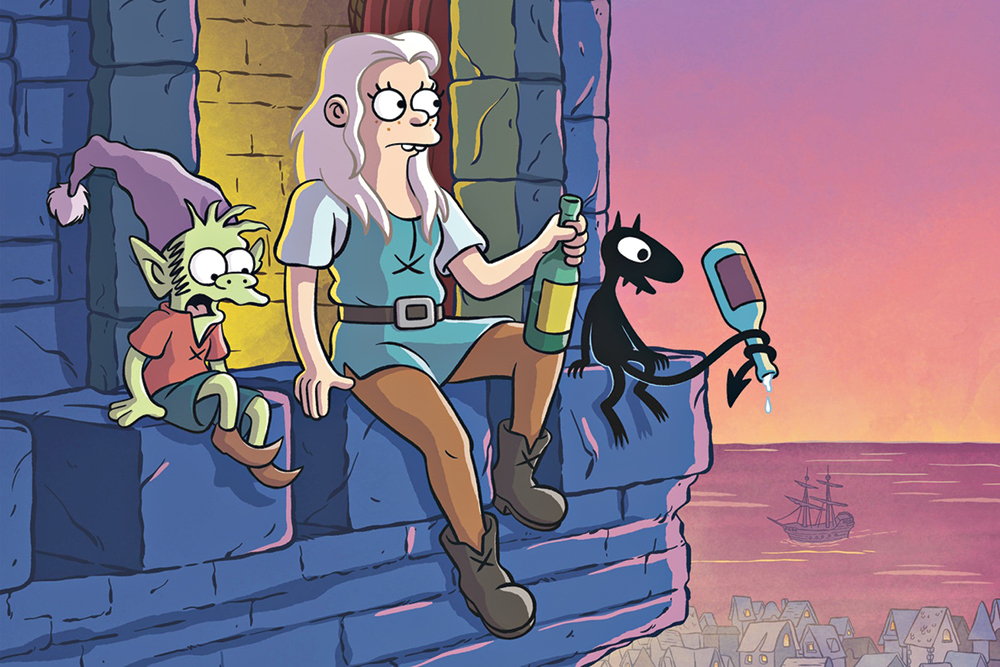
A scene from ‘Disenchantment’ Courtesy: Netflix
Disenchantment
Created by: Matt Groening
After tackling issues of our times in The Simpsons and the future on Futurama, cartoonist and animator Matt Groening takes us on a trip into the past with his first new venture in a long time. Revolving around a hard-drinking young princess who is anything but your typical fairy-tale royalty, Disenchantment follows the misadventures of Bean as she tries to make sense of her reality and come to terms with her responsibilities, encountering the likes of ogres, spirits, imps and trolls with her oddball team of a spunky elf companion Elfo and personal demon Luci.
While many may not take the name of the show in the same breath as Groening’s other work or even remotely consider it a cultural phenomenon, the show still has his signature offbeat characters in entertaining and, more often than not, bizarre situations. If you’re a fan of either The Simpsons or Futurma, you will be compelled to compare Disenchanted with the classics; the genius of Groening is very much there. Even after reigning supreme for more than three decades with two genre-bending shows, the animator is pushing forward in the age of streaming that demands binge-worthy shows with big narrative sways, something that Disenchanted has been successful at... so far.
Watch it for a whole new take on a typical fairy tale or if you want to see how an iconic animator keeps up with the changing times.
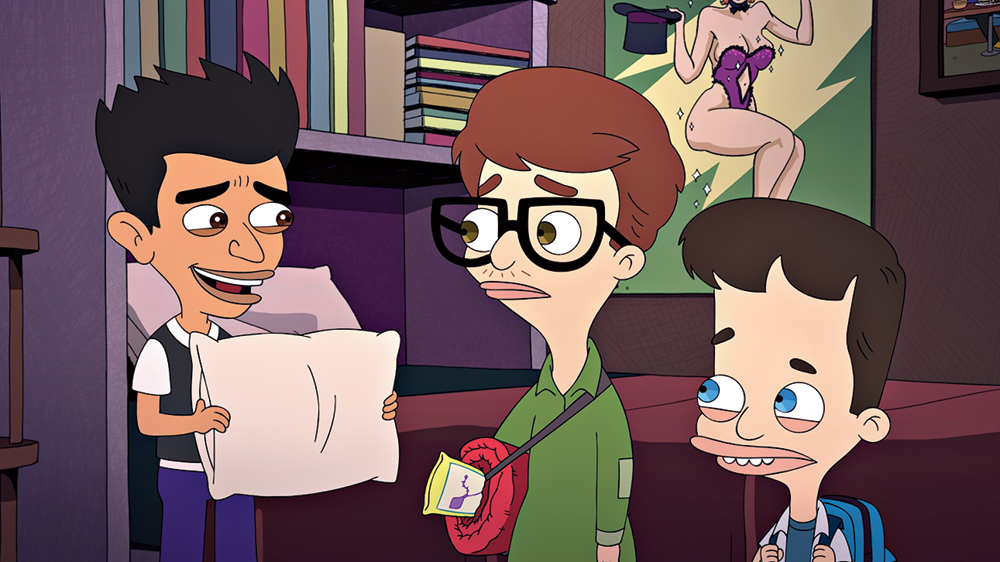
A scene from ‘Big Mouth’ Courtesy: Netflix
Big Mouth
Created by: Nick Kroll, Andrew Goldberg, Mark Levin and Jennifer Flackett
Say what you may about your school life, middle school was weird. We were all experiencing puberty, were inquisitive about our bodies, had our own insecurities and a sackful of questions we thought we couldn’t ask our parents. Think of Big Mouth as watching an animated version of yourself going through that growing phrase, albeit with more hilarity and bawdiness and less awkwardness and embarrassment. The show follows four friends through the earliest stages of puberty and deals with topics like menstruation, masturbation and sex in a way that is hilarious but cuts through the humiliation when we try to relate ourselves with the characters on screen — almost making us want to relive that period but, at the same time, has us wishing that we had someone who could answer those questions back then. With a plot like this, the makers could’ve pursued several ways to portray the awkward teenagers grappling with the realities of life. Instead, Big Mouth looks at it through a lens of fantasy where every insecurity is personified — there are hormone monsters, shame wizards and even a few ghosts. The most effective point that the series drives home is that there is no question that can’t be asked and no one answer can apply to everyone.
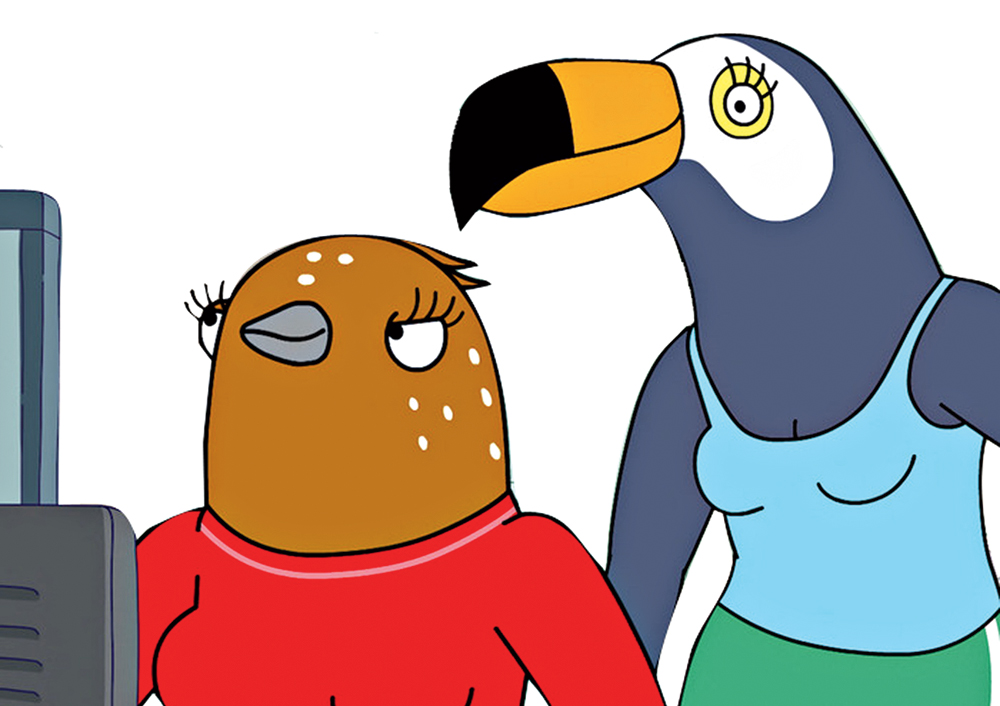
A scene from ‘Tuca & Bertie’ Courtesy: Netflix
Tuca & Bertie
Created by: Lisa Hanawalt
At first glance, the show may come across as a silly, adult, animated effort that desperately makes an attempt to win over millennials — be it in way of the slow start or the eccentric style of animation. A couple of episodes down, one can see the genius of the show. Coming from the same team that has given us BoJack Horseman, Tuca & Bertie explores the friendship of two bird-women who have nothing in common besides a shared apartment and the challenges they face as bird-ladies in a bird-men world. The casting of the titular characters is on point — Tiffany Haddish is the cocky, carefree toucan, Tuca, while stand-up comedian Ali Wong voices the anxious and worrisome songbird Bertie. They give us a glimpse of what it’s like for women to live in a big city and the hard-hitting issues it brings. Plus, the show reminds us that unlikely friendships are, at times, the best.
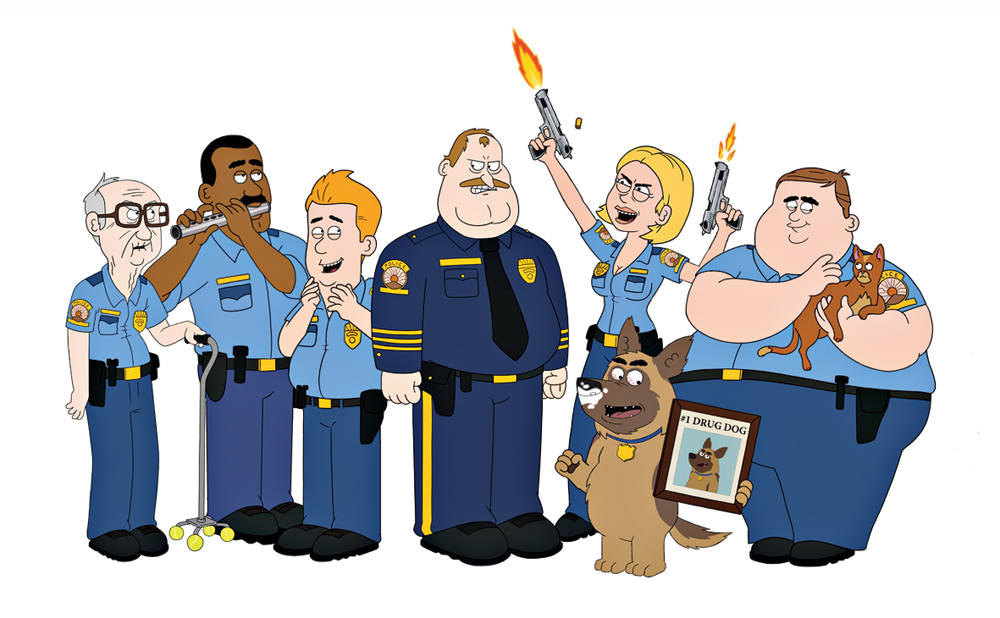
The characters of ‘Paradise PD’ Courtesy: Netflix
Paradise PD
Created by: Waco O’Guin and Roger Black
From the team behind Brickleberry, the series follows the story of a group of misfit police officers who are unfit to be even boy/girl scouts. The characters, their relationships, their tropes and the talking sentient animal sidekick keep us hooked. Much like Disenchantment, Paradise PD echoes vibes of the previous work from the creators but they still make an attempt to be innovative.
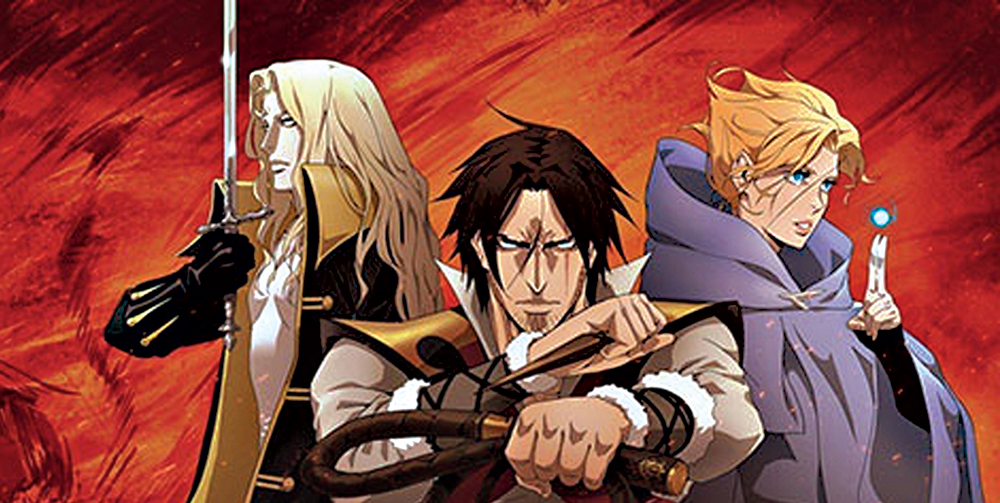
A scene from ‘Castlevania’ Courtesy: Netflix
Castlevania
Based on: The video game series of the same name by Konami
It’s 2019 and video games have hardly been successful in translating themselves into films or even television series. That being said, Castlevania, based on Konami’s popular video game franchise, just had mediocrity as its competition when it was announced and it did not disappoint.
Adapted by award-winning Marvel comics writer Warren Ellis and directed by Sam Deats, Castlevania successfully emulates the bloody narrative and Gothic screenplay from the source material. Essaying a video game franchise in a web series sure is a monumental task and there’s a bunch of things one should keep in mind — the possibility of stretching an interactive medium over multiple seasons without diluting the plot, sticking to the storyline and, most importantly, not losing the essence of the game. Castlevania has dealt with these issues with much care and what we see is more like supplementary material to the video game. One can even say that it expands and deepens an already vast, dark work of the series.
If you haven’t played any of the games then you would surely be blown away by the inexplicably good writing that tends to make you side with the antagonist. And talking about antagonists, it has the best kind — the one that has a point.
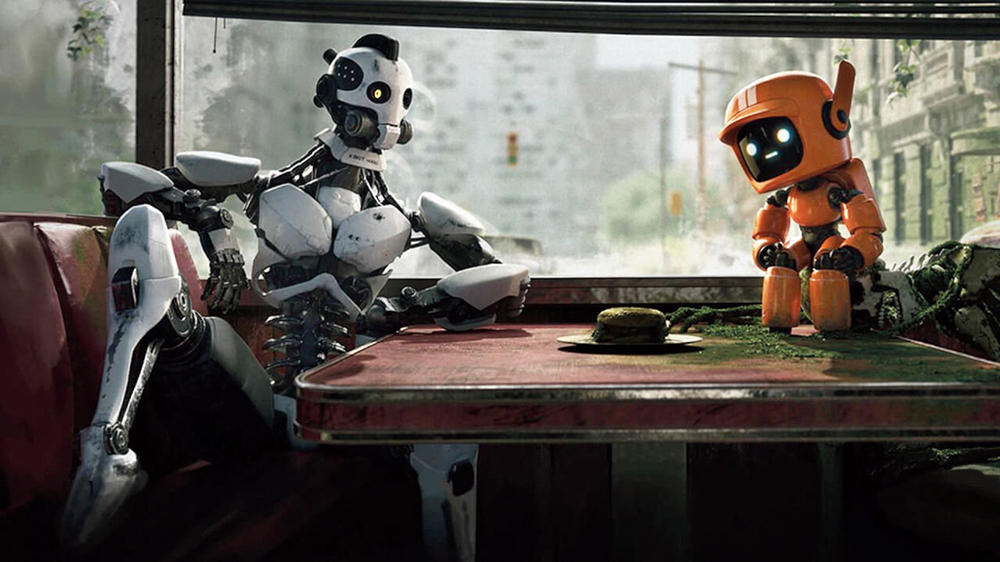
A scene from ‘Love, Death + Robots’ Courtesy: Netflix
Love, Death + Robots
Created by: Tim Miller
An animated science-fiction anthology series, Love, Death + Robots will make you feel everything from disgust to merriment, owing to the sheer variety and number of topics it deals with. A weird offspring of sorts of the cyberpunk movies of the ’80s and Black Mirror, each episode of this over-the-top animated anthology varies widely in tone, subject, style and storytelling. The stories range from hyper-violent and hyper-sexual tales to entertaining and even morbid reflections of the human condition. This juxtaposition of disturbing and borderline ridiculous elements will definitely, for the lack of a better word, “unlock” hidden regions of your brain and will most certainly make you look at your life in a different way.
The episodes aren’t pretty long either — 18 psychedelic shorts that range from five to 17 minutes of runtime, Love, Death + Robots is best enjoyed in a single sitting. The photorealistic CGI used in this series is, well, just too photorealistic and devilishly close to perfection. Animation styles are just as varied as the subject matter. Some could be mistaken for cut scenes from video games like Mass Effect or Red Faction, while some have traditional styles like Spider-Man: Into the Spiderverse. Watch if you want to experience a more human side of science fiction or if you just want to see a legendary collaboration of David Fincher and VFX icon, Tim Miller.
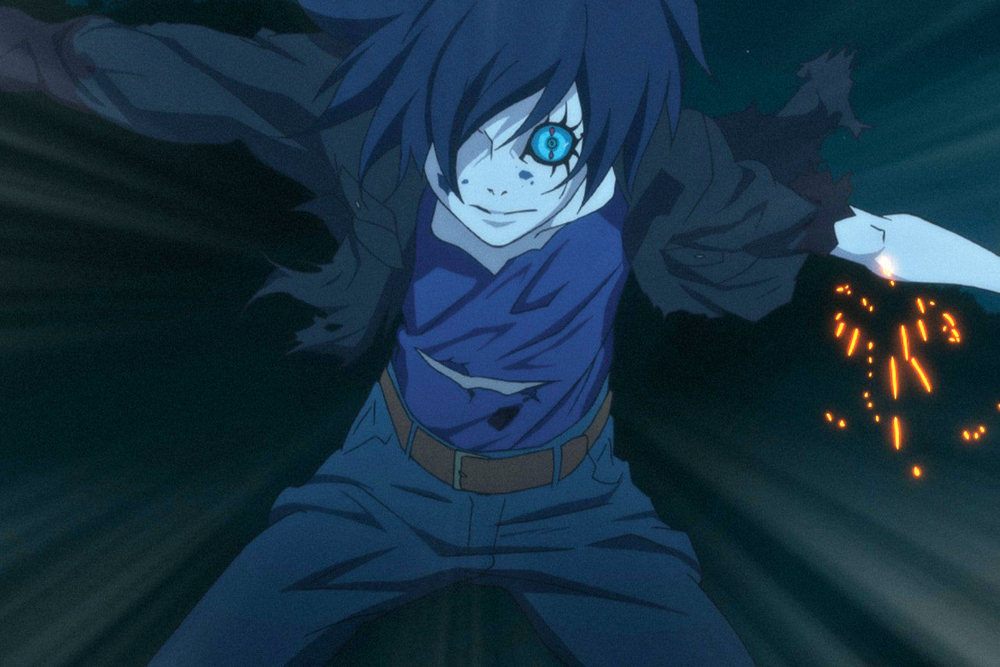
A scene from ‘B: The Beginning’ Courtesy: Netflix
B: The Beginning
Created by: Kazuto Nakazawa and Production I.G.
A blend of detective, thriller and fantasy genres, B: The Beginning is a gritty crime drama, complete with an interesting storyline, non-linear storytelling using multiple perspectives and the right amount of action bordering graphic violence but never excessive. We follow a team of detectives — led by a Keith Flick — tasked with taking down a vigilante serial killer, Killer B, who has supernatural powers that, in turn, make him a target of another mysterious group. The edge-of-the-seat premise, however, has huge swaths of its plot overshadowed by several subplots that, even with some pretty badass action sequences, are not able to flesh out in a cohesive manner and would have been best left to be explored in the second season. That said, this anime’s multilayered story will leave you guessing on a variety of fronts after you have watched the 12 episodes — from Killer B’s true identity and his connection with the protagonist to the mysterious group that stakes a claim on his life.
Ended but still relevant
Futurama
After being given a second life by Comedy Central, Futurama made a permanent spot on watch lists, so much so that it’s still difficult to believe that the show ended six years ago. Thanks to the many meme formats the show has given us, we just can’t forget it. Set way into the future, in 2999, Futurama gave us some of the funniest, darkest and well-written metaphors of all time. Even though it was an animated show that neither took itself or its subject seriously, it did, in fact, give us an opportunity to look at our present selves through the eyes of the future and reminded us that there will be some societal problems that will always exist.
Death Note
A must-watch for any anime lover, Death Note is still relevant almost 12 years after it ended, thanks to the disappointing Netflix adaptation. A disinterested high-school student with a pretty strong God complex, Light Yagami discovers the notebook of the God of Death that gives him the power to kill anyone by simply inscribing their name inside. A compelling plot and its availability on Netflix still makes it the first choice for many anime enthusiasts.
King Of The Hill
Another animated series resurrected by the power of memes, King of the Hill still makes for great viewing. Mike Judge (of Office Space, Silicon Valley, Beavis and Butt-head fame) and Greg Daniels’s (of The Office, Parks and Recreation and Saturday Night Live) animated family sitcom was a refreshing breather from its more surreal and satirical contemporaries. Lasting 13 seasons, it gave us a glimpse of the life of a typical Southern household going about their lives.
2019 is a milestone year for three shows
30 years: The Simpsons
The establishment. The granddaddy of modern adult animated shows. The one that started it all. After hitting the small screen on December 17, 1989 with tongue-in-cheek humour and a cheeky take on the modern middle-class American family, The Simpsons continue to be a big hitter. From predicting an awfully large number of pop culture events to pushing the very boundary of existing genres and turning it on their heads, no other show has had as much an impact on pop culture as The Simpsons.
20 years: Family Guy
On air for almost two decades now (first episode screened on January 31, 1999), Family Guy has managed to shock audiences with its tangential humour and has often gone far and beyond the usual limits of what people find acceptable and are fine with laughing at. After battling two cancellation threats in its first couple of seasons, America’s second favourite family (don’t forget The Simpsons!) and their sentient dog has come all the way to create an empire while giving less and less attention to political correctness.
10 years: Archer
Archer is what you get when you roll James Bond, Ethan Hunt and Jason Bourne into one. A royal mishmash of retro-style spy stories with technology from the future, Archer is about a narcissistic super-agent Sterling Archer with an all-star team. With a unique art style, dry humour, egotistical heroism and a uber-cool — but at times straight-up insane — spy team, Archer is a great choice for both those who love spy flicks and those who’ve never watched one but have a taste for dark humour.

